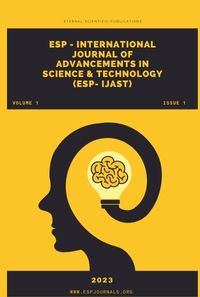ESP International Journal of Advancements in Science & Technology [ESP-IJAST]
Citation :
Rajesh Munirathnam, 2024. "Blockchain and Data Science in Pharmaceuticals: Enhancing Transparency and Traceability in Drug Supply Chains" ESP International Journal of Advancements in Science & Technology (ESP-IJAST) Volume 2, Issue 1: 67-81.
Abstract :
The key issues related to supply chain transparency and traceability are among the most crucial and complex for the pharmaceutical industry, especially considering such issues as counterfeits, compliance, and effectiveness. Using blockchain technology is, therefore, the subject of this paper since it can be combined with data science to come up with a reliable solution to these problems. Blockchain offers the technological solution for establishing a securely shared record of all transactions and communications across the concerned supply chain network functional and geographical location, and thus guarantees transparency and data reliability; structured and unstructured data science brings into the process methods and tools that empower efficient and effective or and predictive models that become strategic tools to manage the rising complexity in supply chains. Altogether, these technologies can increase the prospects of drug traceability, increase compliance with the regulations and minimize the threat of counterfeit drug penetration in the supply chain. Potential benefits for reformation through the use of blockchain and data science include increased organizational performance by pharmaceutical companies, the building of consumer trust, and compliance with strict industry regulations. This paper explores the opportunities, risks, and advantages of these technologies in the pharmaceutical supply chain and presents success stories of each of these technologies.
References :
[1] Tian, F. (2016). An agri-food supply chain traceability system for China based on RFID & blockchain technology. 11th International Conference on Service Systems and Service Management (ICSSSM), 1-6. DOI: 10.1109/ICSSSM.2016.7538424
[2] Transforming Drug Traceability with Blockchain Technology, spydra, online. https://www.spydra.app/pharma-tokenization
[3] Mackey, T. K., & Nayyar, G. (2017). A review of existing and emerging digital technologies to combat the global trade in fake medicines. Expert Opinion on Drug Safety, 16(5), 587-602. DOI: 10.1080/14740338.2017.1313227
[4] Panda, S. K., & Satapathy, S. C. (2021). Drug traceability and transparency in medical supply chain using blockchain for easing the process and creating trust between stakeholders and consumers. Personal and Ubiquitous Computing, 1-17.
[5] Dhar, V., & Stein, R. M. (2017). Seven ways predictive analytics can improve healthcare. Journal of Clinical Analytics, 3(2), 55-64. DOI: 10.1007/s41100-017-0023-7
[6] Kshetri, N. (2018). 1 Blockchain's roles in meeting key supply chain management objectives. International Journal of Information Management, 39, 80-89. DOI: 10.1016/j.ijinfomgt.2017.12.005
[7] Kamble, S. S., Gunasekaran, A., & Sharma, R. (2020). Modeling the blockchain enabled traceability in agriculture supply chain. International Journal of Information Management, 52, 101967. DOI: 10.1016/j.ijinfomgt.2019.05.023
[8] Ryan, P., & Donohue, C. (2019). Regulating blockchain: Techno-social and legal challenges. Critical Analysis of Law, 6(2), 147-165. DOI: 10.1080/21670244.2019.1700378
[9] Tseng, J. H., Liao, Y. C., Chong, B., & Liao, S. H. (2018). Governance on the drug supply chain via Gcoin blockchain. International Journal of Environmental Research and Public Health, 15(6), 1055. https://doi.org/10.3390/ijerph15061055
[10] Kouhizadeh, M., & Sarkis, J. (2018). Blockchain practices, potentials, and perspectives in greening supply chains. Sustainability, 10(10), 3652. https://doi.org/10.3390/su10103652
[11] Kuo, T. T., Kim, H. E., & Ohno-Machado, L. (2017). Blockchain distributed ledger technologies for biomedical and health care applications. Journal of the American Medical Informatics Association, 24(6), 1211-1220. https://doi.org/10.1093/jamia/ocx068
[12] Tse, D., Zhang, B., Yang, Y., Cheng, C., Mu, H., & Liu, Y. (2017). Blockchain application in food supply information security. 2017 IEEE International Conference on Industrial Engineering and Engineering Management (IEEM), 1357-1361.
[13] Polyzos, G. C., & Fotiou, N. (2017). Blockchain-assisted information distribution for the Internet of Things. 2017 IEEE International Conference on Information Technology (ICIT), 209-214.
[14] Lin, I. C., & Liao, T. C. (2017). A survey of blockchain security issues and challenges. International Journal of Network Security, 19(5), 653-659.
[15] Al-Saqaf, W., & Seidler, N. (2017). Blockchain technology for social impact: Opportunities and challenges ahead. Journal of Cyber Policy, 2(3), 338-354. https://doi.org/10.1080/23738871.2017.1400084
[16] Saberi, S., Kouhizadeh, M., Sarkis, J., & Shen, L. (2019). Blockchain technology and its relationships to sustainable supply chain management. International Journal of Production Research, 57(7), 2117-2135. https://doi.org/10.1080/00207543.2018.1533261
[17] Viriyasitavat, W., & Hoonsopon, D. (2019). Blockchain characteristics and consensus in modern business processes. Journal of Industrial Information Integration, 13, 32-39. https://doi.org/10.1016/j.jii.2018.07.004
[18] Montecchi, M., Plangger, K., & Etter, M. (2019). It's real, trust me! Establishing supply chain provenance using blockchain. Business Horizons, 62(3), 283-293. https://doi.org/10.1016/j.bushor.2019.01.008
[19] Dinh, T. N., Liu, R., Zhang, M., Chen, G., Ooi, B. C., & Wang, J. (2017). Untangling blockchain: A data processing view of blockchain systems. IEEE Transactions on Knowledge and Data Engineering, 30(7), 1366-1385. https://doi.org/10.1109/TKDE.2017.2781227
[20] Andoni, M., Robu, V., Flynn, D., Abram, S., Geach, D., Jenkins, D., & Peacock, A. (2019). Blockchain technology in the energy sector: A systematic review of challenges and opportunities. Renewable and Sustainable Energy Reviews, 100, 143-174. https://doi.org/10.1016/j.rser.2018.10.014
[21] Bocek, T., Rodrigues, B. B., Strasser, T., & Stiller, B. (2017). Blockchains everywhere - A use-case of blockchains in the pharma supply-chain. 2017 IFIP/IEEE Symposium on Integrated Network and Service Management (IM), 772-777. https://doi.org/10.23919/INM.2017.7987376
[22] Apte, S., & Petrovsky, N. (2016). Will blockchain technology revolutionize excipient supply chain management? Journal of Excipients and Food Chemicals, 7(3), 76-78. https://doi.org/10.12723/ijexim.07.01.05
[23] Rajesh Munirathnam, 2022. "Precision Medicine in Oncology: How Data Science is Revolutionizing Cancer Treatment", ESP Journal of Engineering & Technology Advancements 2(2): 114-124.
[24] Rajesh Munirathnam, 2022. "The Future of Pharmacovigilance: Using Data Science to Predict and Prevent Adverse Drug Reactions", ESP Journal of Engineering & Technology Advancements, 2(4): 130-141.
[25] Rajesh Munirathnam, 2023. "Data Science and Regulatory Affairs: Navigating the Complex Landscape of Drug Approval Processes", ESP International Journal of Advancements in Computational Technology (ESP-IJACT), Volume 1, Issue 1: 96-109.
[26] Rajesh Munirathnam, 2023. "Data-Driven Strategies for Combatting Antimicrobial Resistance: The Role of AI in Developing New Antibiotics", ESP International Journal of Advancements in Computational Technology (ESP-IJACT), Volume 1, Issue 2: 112-125.
Keywords :
Blockchain, Data Science, Pharmaceuticals, Drug, Transparency, Traceability, Regulatory Compliance.


 : 10.56472/25839233/IJAST-V2I1P110
: 10.56472/25839233/IJAST-V2I1P110